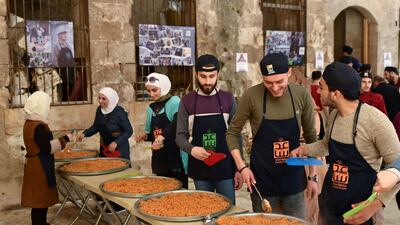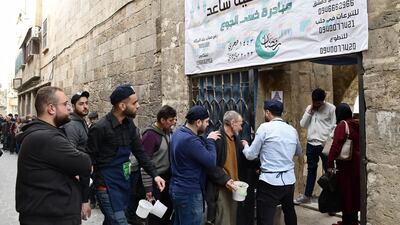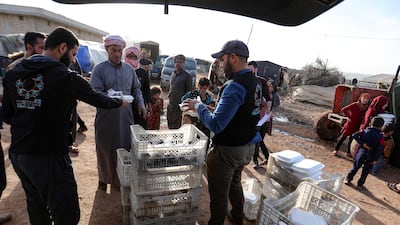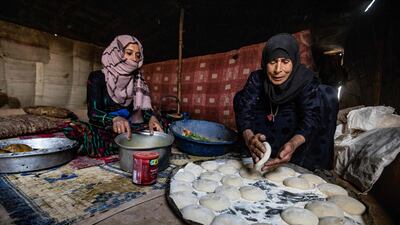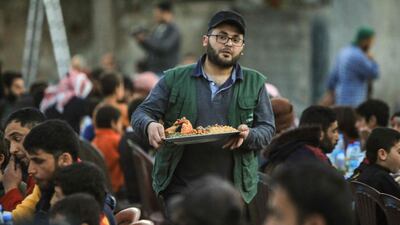At an outdoor kitchen in the heart of Damascus, set up just metres away from the Syrian capital’s famed Umayyad Mosque, dozens of volunteers toil away to prepare thousands of meals before the sun sets.
The volunteers are from Saaed, a local non-profit group that has been feeding Syria’s hungry masses during Ramadan for the past decade.
The charitable practice, common in other parts of the region, was unknown in Syria before the onset of a civil war that has left most of its people impoverished and in need of aid.
“Field kitchens were never seen in Syria before the war,” says founder Essam El Habal, as he adds handfuls of salt to a massive pot of boiling rice.
"But the violence and financial sanctions have left many Syrians impoverished and in need, which made it up to us — those who can — to join hands and help."
A UN report released last month showed more than 90 per cent of Syria’s population are living below the poverty line, while 12 million — more than two-thirds — have insecure food supplies and 14.6 million need humanitarian assistance.

“Fewer people had sufficient access to nutritious food in Syria than at any other point during the last 10 years,” the World Food Programme said of 2021.
The UN agency attributed this to a devastated economy that deprived many of livelihoods and sufficient income, while food prices continued to rise.
‘Be gone, hunger’
The humanitarian crisis has made the services of Saaed, and similar groups, more important than ever.
Under the motto of “Khasi al jou” — “Be gone, hunger” in Syrian dialect — Saaed has provided more than four million meals over the past 10 years.
On the first day of Ramadan this year, April 2, the group handed out 5,000 meals.
“Food is offered to anyone who comes with pots and containers to be filled up,” Mr El Habal told The National.
"Other meals are delivered to the doorsteps of impoverished families whose details we’ve gathered."
The number of meals provided by Saaed rose steadily from 130,000 in 2013 to 750,000 in 2019, before dipping because of the coronavirus pandemic.
“In 2020, due to Covid-19, we managed to distribute 150,000 meals only as we worked within a limited, closed kitchen, under strict precautionary regulations to ensure everyone’s safety,” Mr El Habal says.
The National was unable to speak to beneficiaries of the initiative because of media regulations imposed by the government to respect the recipients' privacy and avoid embarrassing them.
A team of about 125 volunteers operates the field kitchen in Damascus, where barriers are set up to control the crowd.
Other teams operate in the capital's rural outskirts, as well as across Aleppo and Al Quneitra. Altogether, Saaed has about 3,000 people working to feed the hungry.
Joy of giving
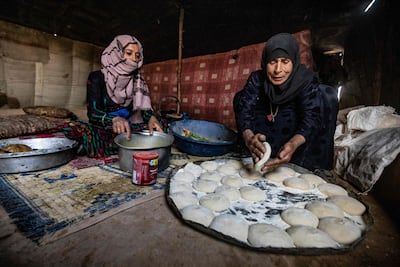
Working long hours under the hot sun to meet the deadline of sunset, which is when Muslims break their day’s fast, Saaed’s volunteers have clearly divided tasks to ensure everything runs smoothly.
While some chop vegetables, prepare ingredients and handle boiling pots, others are assigned to fill the containers of those who come to the kitchen or pack meals for delivery.
Moataz Hamouda, a volunteer in his 20s, has been a part of Saaed’s team for eight years. Mr Hamouda says being part of the kitchen is a “fulfilling passion” to which he looks forward every year.
“It's an image I like being a part of, that of a group of considerate youths who come together for a good cause,” he says. “Only Syrians feel the plight of other Syrians."
While Mr Hamouda performs various tasks as needed, “the best moments of my life are when I deliver food to families right before sunset call for prayer”.
“This always leaves a profound impression in my heart,” he says.
Mr El Habal says the meals are all provided through donations.
“Benefactors provide the ingredients for us to use and always request to remain anonymous out of respect to Syrian families, many of whom feel uncomfortable about the economic state they have reached due to the ongoing circumstances," he says.
"Merchants also provide some of our ingredients at discounted prices or for free."
Financial burdens and economic hardship crop up frequently in the chatter among Saaed volunteers as they prepare the food, and also among the crowds who start to gather as sunset nears.
The World Food Programme says rapidly growing needs “have outpaced contributions despite strong donor support”.
Despite his young age, Faris Al Hamoud, 10, is well aware of the hardship all around after volunteering at Saaed for four years.
As he peels carrots, he tells The National that his volunteering has taught him selflessness and compassion.
"I pray for Saaed’s meals to reach all those in need in Syria. I really do pray that ‘hunger, be gone'," Faris says.
This story has been published in collaboration with Egab.
